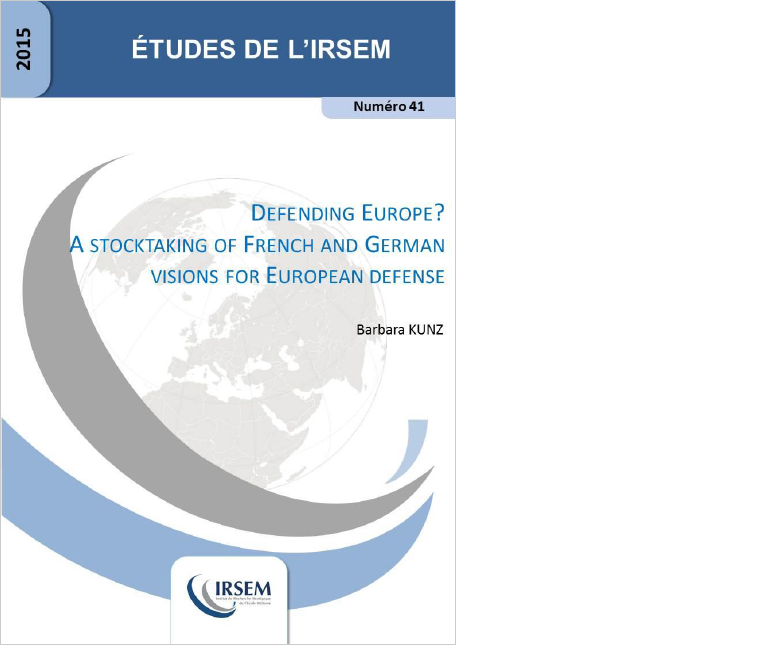
Defending Europe? A stocktaking of French and German Visions for European Defense
The aim of this study consists of taking stock of strategic thinking in France and Germany. More concretely, it intends to identify compatible and incompatible aspects, as well as the potential for compromise, in these national considerations on the future of CSDP and NATO. In so doing, it concentrates on five issues: strategic visions, threat perception and military doctrine; the institutional framework for European defense; military interventions; capabilities as well as the industrial dimension.
Will the party “Alternative for Germany" be able to establish itself on the German political landscape?
Only a few months after it had been founded, the Alternative for Germany party (AfD) won 4.7% of the second votes in the federal elections, on 22 September 2013 – only 130,000 short of what was required for entry into the German Bundestag. Party and election researcher Oskar Niedermayer called it a "successful failure".

Tyskland - stormakt mot sin vilja?
In this article our research fellow Barbara Kunz summarises the broad outlines of German foreign policy to the Swedish public.
The German Debate on TTIP
The German economy is characterized by a very high degree of international openness – much more so than in other European countries such as France. Its economic success hence largely depends on the intensity with which it trades with the rest of the world, and in particular the United States who play a crucial role. Against this backdrop, it would seem logical that Berlin would welcome signing a free-trade agreement between the U.S. and the European Union.
Deploying the Bundeswehr: more transparency, more flexibility, but Parliament’s consent remains key - The Rühe Commission’s final report
Besides the often invoked historical dimension behind Germany’s strategic culture of restraint, there are today very tangible legal reasons that prevent assertive German military interventionism (which are, of course, directly linked to the historical dimension): any intervention of the German armed forces requires the Bundestag’s consent.
The “2014 Review”: Understanding the Pillars of German Foreign Policy and the Expectations of the Rest of the World
German foreign policy is today confronted with a number of fundamental challenges. The country has become larger and has again become strong economically and must no longer content itself with its former role as France’s political junior partner in Europe or the United States’ junior partner in the world. At the same time, Berlin is far from being fully prepared for taking over this new role – deficits are both strategic and conceptual.

Germany's Unnecessary Hegemony
Based on the realist theory of international relations, this article analyses whether Germany has any incentives to seek (regional) hegemony. It concludes that under the current systemic circumstances – in which the country's survival is ensured by the United States – Germany has no reason to become a hegemon, which is normally a strategy to escape the perils of the anarchic international system.
Germany: The Past that Does not Pass
Germany’s responsibility in the two global conflicts reflects, among other things, the German military’s desire to free itself from political control and the depth to which the Wehrmacht was immersed into Nazi ideology and a Nazi state whose orders it never really contested.

Europe's Place in the World: from 1914 to 2014
The first wave of globalization in the 20th century triggered deep upheaval of the organization of power and an overall depreciation of European nations.
Year 2 of Germany's Energy Transition
After a decade characterised by the take-off of renewable energies, Germany decided in 2010 to make them the top priority. At the same time, it decided to make exemplary efforts in terms of energy efficiency and the reduction of greenhouse gases. The audacious nature of this policy was strengthened by the “turn” taken in 2011 to give up nuclear energy in the wake of the Fukushima accident.
Support independent French research
Ifri, a foundation recognized as being of public utility, relies largely on private donors – companies and individuals – to guarantee its sustainability and intellectual independence. Through their funding, donors help maintain the Institute's position among the world's leading think tanks. By benefiting from an internationally recognized network and expertise, donors refine their understanding of geopolitical risk and its consequences on global politics and the economy. In 2024, Ifri will support more than 70 French and foreign companies and organizations.















